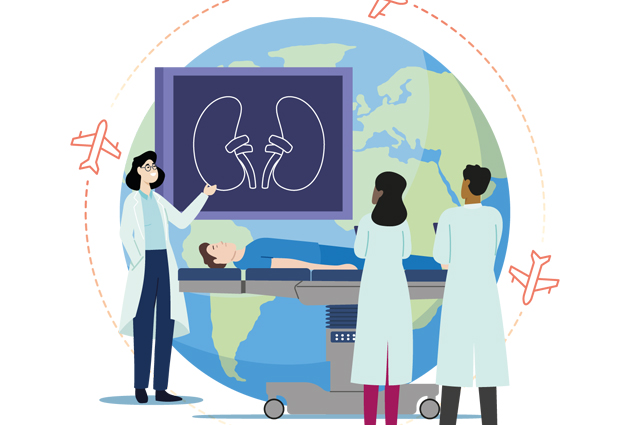Former ISN Fellow Sets Up First Peritoneal Dialysis Center in Pakistan – Get Inspired by His Account and Apply to the ISN Fellowship Program!
Dr. Muhammad Mohsin Riaz, Ali Fatima Hospital/Abu Umara Medical & Dental College, Lahore, Pakistan.
I am a nephrologist from Lahore, Pakistan – an LMIC country according to the World Bank. Universal health insurance has only recently been launched in some provinces in Pakistan, revolutionizing the health system. Before that, access to health care was a privilege. Even with this step forward, however, most people cannot afford standard health care.
I graduated from medical school in 2008 and completed my fellowship in nephrology in 2016. My supervisor and mentor, Prof. Dr. Nauman Tarif, encouraged me to seize the opportunity of an ISN Fellowship to help me excel in my nephrology practice. I learned about this opportunity two weeks before the application deadline. It took a little extra effort to complete all the paperwork in time, but it was a day of joy and excitement when I received an email from the ISN that I had been awarded the scholarship.
Find out more about ISN Fellowships here and apply by October 1
I went to Peking University, Beijing, China, for advanced training in peritoneal dialysis (PD) and interventional nephrology. My intention was to start a PD program in my native country on my return. I was also interested in learning tunneled catheter placement. My host mentor, Professor Zhao, was very kind and supportive. He helped in every possible way and made learning easy for me.
Before beginning the ISN fellowship, I had been struggling with a research project involving membranous glomerulopathy. We were trying to stain our diagnosed cases of MGN for PLA2R antibodies. Despite all our efforts, we were unable to get accurate results. Professor Zhao helped me overcome this issue during my scholarship with his kind support. I also published a paper in a local journal based on all the experience I gained during my stay in the research center at Peking University.
I spent six months in the dedicated unit of peritoneal dialysis. The PD unit, headed by Professor Dong, has a vast bank of around 500 patients. During my stay, I became fully competent in patient management procedures: induction, follow up and troubleshooting. I also observed PD catheter insertion there. Because of local restrictions, I could not perform hands-on catheter insertion, but my time observing the activity was extremely helpful when it came to performing the procedure myself after returning to my home country.
Since being back in Pakistan, I have set up the first dedicated Peritoneal Dialysis Unit in Pakistan. We provide PD catheter insertion, induction on PD, including urgent start PD, proper follow-up plans, and troubleshooting. Since last October, I have inducted 57 patients on peritoneal dialysis.
In collaboration with other local nephrologists, and with support and guidance from the ISN, we founded the Peritoneal Dialysis Academy of Pakistan to promote PD in Pakistan. Through this initiative, we have held several courses and hands-on workshops for doctors and technical and nursing staff. I conducted two PD workshops at the last two Pakistan Society of Nephrology conferences.
In collaboration with my hospital, we established a team of PD technicians for home patient training and troubleshooting.
Having started placing PD catheters with assistance from a general surgeon, I am now carrying the procedure out myself using fluoroscopy. I am presenting a paper
comparing open versus fluoroscopic techniques at the International Society for Peritoneal Dialysis 2022 conference.
I have placed 52 successful permanent catheters at my health center with a minimum rate of complications. I’m currently analysing the data, which I hope to get published in a well-reputed journal.
With further guidance and support from the research staff at Peking University, we concluded our research project on membranous nephropathy and successfully got IHC staining in our primary membranous patients.
I’m very grateful to the ISN for providing me with this opportunity, which is helping to transform kidney care in my native city. It has also boosted my career: I have been promoted to assistant professor and lead a nephrology unit in a tertiary care facility. I’m now starting a training program at my hospital to pass on my skills to a new generation of young nephrologists.
I’m also thankful to the ISN for allowing me to share my experience with fellows worldwide. I hope this account will encourage others to benefit from ISN granting and educational activities.











